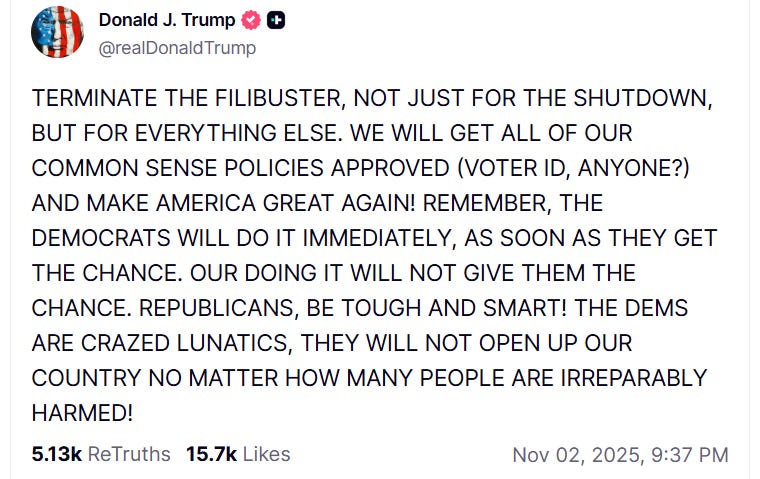|
Trump wants Republicans to kill the filibuster. Great!
In the long run, it would be good for Democrats and democracy.
Public Notice is supported by paid subscribers. Become one ⬇️
With the government shutdown entering its second month, President Trump has found his solution: Senate Republicans should eliminate the filibuster, which they can do with a simple majority vote.
Do that, and Democrats will no longer stand in their way. They can end the shutdown tomorrow and without giving up anything. Then they can get to passing the rest of the GOP’s legislative agenda.
As much as he might like the idea, it’s hard to know how committed Trump is to it. So far, he hasn’t put serious pressure on Senate Republicans to do his bidding on the filibuster (though he reportedly might start squeezing them soon). But Democrats should hope he does, and that he gets GOP senators to fall in line.
That’s because even though filibuster elimination would be bad in the short term — that is, at least through the midterm elections, at which point Democrats may take control of one or both houses of Congress — in the long run it would still be good for both progressive policy priorities and the responsiveness of our democracy.
Short term pain, long term gain
We haven’t had the filibuster debate in a while, but it usually comes up when Democrats are in control and find themselves thwarted by Republicans.
The filibuster allows the minority party to kill almost any bill in the Senate. No matter how popular it might be, without 60 votes for passage, even the most worthy legislation will die. Joe Biden was only the latest Democrat to find his agenda ground to a halt despite having majority support in both houses for much of what he wanted to pass.
Over time the filibuster has been altered and changed. It can no longer be deployed against judicial and executive branch nominations, and Mr. Smith Goes to Washington-style “talking filibusters” are no longer used to stop legislation (though every now and then a senator conducts a speaking marathon just to draw attention to an issue).
The basic logic of maintaining the filibuster is this: We’d rather get none of what we want, so long as we can stop the other party from getting anything it wants. There are some in both parties who feel this way.
The problem from the perspective of Democrats is that they are the party that wants an activist government. To put it another way, they simply want to do more things than Republicans do, so a status quo of near-total gridlock extending indefinitely hurts them more than it hurts the GOP, for whom a government unable to solve the country’s problems is a feature, not a bug.


